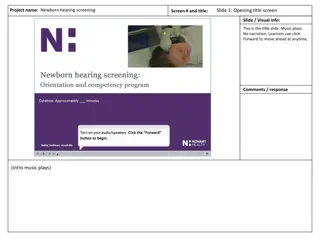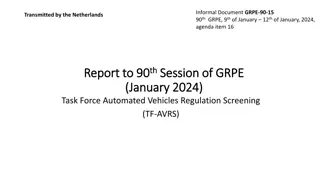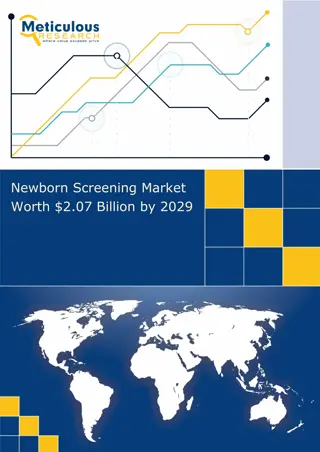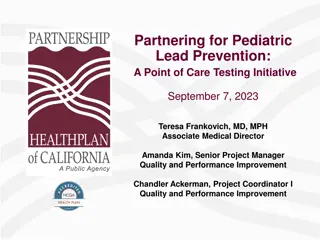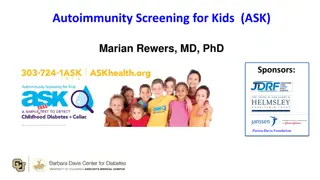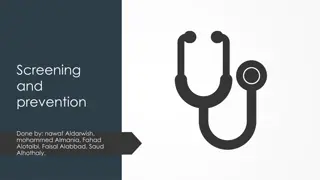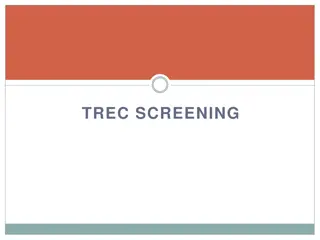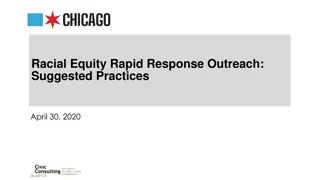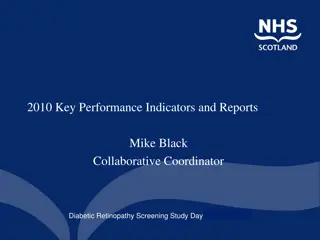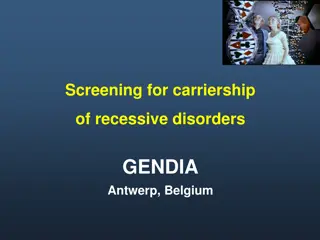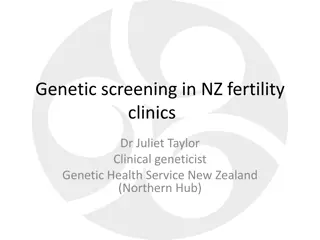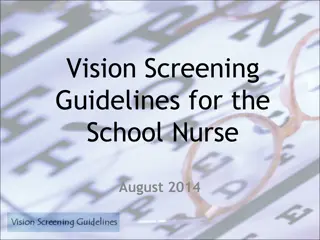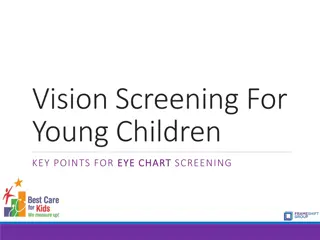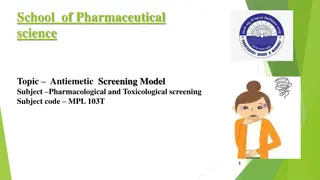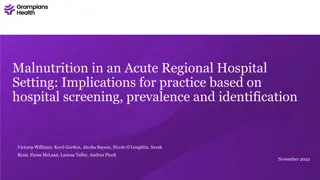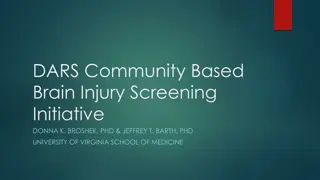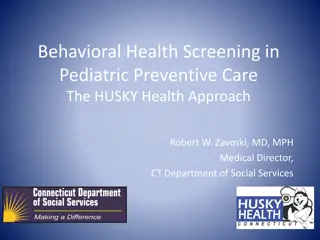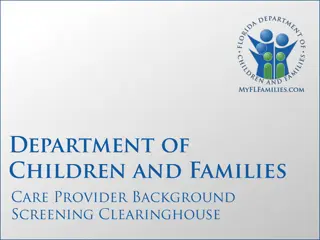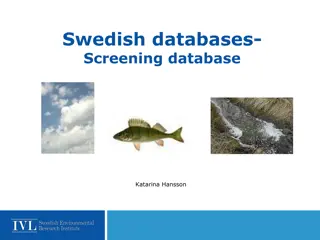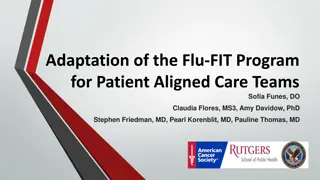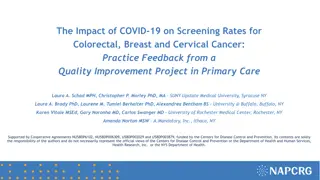Understanding Newborn Screening in Oklahoma
Newborn screening in Oklahoma is crucial for detecting hidden disorders in newborns that may not be apparent at birth. Early detection through screening can lead to timely treatment, ensuring healthy development and potentially saving lives. The process involves testing every newborn for harmful con
1 views • 88 slides
Patient Screening and Workflow Process Optimization
The flowcharts and descriptions detail the steps involved in identifying eligible patients for screening, managing patient flow during visits, and tracking screening results. The process includes reviewing patient charts, determining screening eligibility, discussing screening options with patients,
2 views • 5 slides
Understanding Lung Cancer Screening Programs and Criteria
Screening for lung cancer is essential for early detection and intervention. CT scans have shown promise in reducing mortality rates, especially in high-risk populations. While challenges like cost and radiation risk exist, initiatives like the National Lung Screening Trial have demonstrated the eff
4 views • 28 slides
Screening for Malnutrition with MUST Tool
Understanding malnutrition is crucial for maintaining optimal health. Screening with the Malnutrition Universal Screening Tool (MUST) is essential to identify individuals at risk. This tool involves assessing BMI, calculating weight loss scores, and determining overall malnutrition risk. Proper scre
5 views • 25 slides
Ensuring Equality of Access to Cervical Screening: Key Considerations
Providing guidance on promoting equality of access to cervical screening, the importance of informed choice, information accompanying screening invitations, and checking for understanding to support individuals making informed decisions. Emphasizes the need for culturally sensitive approaches, espec
5 views • 21 slides
Overview of the NHS Cervical Screening Programme
The NHS Cervical Screening Programme aims to reduce the incidence and mortality of invasive cervical cancer by offering regular screening to eligible individuals. It covers the history, population screening programmes, and key milestones. Learn about the importance, coverage, and guidelines of the p
6 views • 19 slides
Newborn Hearing Screening Program Overview
The Newborn Hearing Screening Project aims to educate healthcare professionals on the importance of early identification of hearing loss in infants. The program discusses the significance of timely intervention, the impact of undetected hearing loss on child development, and provides guidelines for
0 views • 15 slides
Task Force Automated Vehicles Regulation Screening Report
The Task Force Automated Vehicles Regulation Screening (TF-AVRS) conducted multiple meetings and screenings to evaluate regulations and terms related to automated vehicles. The report outlines the screening process, considered items, results, and future plans for regulation screening in the automoti
0 views • 9 slides
Newborn Screening Market Share to be Worth $2.69 Billion by 2031
Newborn screening is a screening program for infants under which pre-symptomatic congenital conditions are detected so that treatment can be commenced as soon as possible to prevent or reduce the long-term consequences of the disease. These programs are usually run by the national or state governing
0 views • 3 slides
Pediatric Lead Prevention Initiative: Best Practices and Screening Performance
This initiative focuses on lead screening in pediatric patients, emphasizing the importance of testing due to the absence of a safe lead level. The program aims to improve compliance with lead testing regulations, including Medi-Cal mandates, and introduce new clinical measures for lead screening. I
1 views • 18 slides
Comprehensive Training on Online Screening Levels, Questions, and Answers
Detailed training agenda for March 22, 2021, covering various aspects of screening levels, creating questions and question sets, and setting up online screening levels. Learn how to effectively carry out screening processes for job openings.
2 views • 94 slides
Autoimmunity Screening for Kids (ASK) Study Findings in Colorado Population
Autoimmunity Screening for Kids (ASK) conducted a study in Colorado on over 30,000 children aged 1-17, revealing a 1.0% prevalence of pre-symptomatic Type 1 Diabetes (T1D) and a 2.1% prevalence of celiac disease/autoimmunity. The screening showed a significant reduction in Diabetic Ketoacidosis (DKA
1 views • 15 slides
Understanding Sanction Regime Framework and Screening Controls
The presented content illustrates the sanction regime framework and screening controls, highlighting the significance of sanctions, who should be screened, and what should be included in the screening process. It covers the scope of sanctions, the importance of sanction screening, tools used for scr
3 views • 42 slides
Comprehensive Guide to Screening and Prevention in Family Medicine
This comprehensive guide explores the definitions, uses, and levels of screening and prevention in family medicine. It covers the criteria for screening tests, types of screening, examples of targeted populations, and approaches to preventing common problems in primary care. The content discusses th
0 views • 73 slides
Prostate Cancer Screening Guidelines in Canada: A Snapshot of Strategies
The Canadian Partnership Against Cancer annually collects and summarizes data on national, provincial, and territorial prostate cancer screening guidelines and strategies. Despite the absence of organized screening programs, some provinces have policies in place, with opportunistic screening by prim
0 views • 13 slides
Understanding Newborn Screening and T-Cell Receptor Excision Circles
The content discusses the importance of newborn screening, characteristics of disorders, T-cell receptor excision circles (TRECs), and the identification of severe conditions like SCID through TREC assay. It highlights the significance of early detection and treatment, emphasizing the value of high-
0 views • 7 slides
Best Practices for Racial Equity Rapid Response Outreach
This document outlines suggested practices for a racial equity rapid response outreach program, focusing on a workflow for patient outreach, prioritizing patients based on specific criteria, and components of screening including wellness checks and screening for chronic medical conditions. The workf
0 views • 6 slides
Comprehensive Overview of Diabetic Retinopathy Screening Study
This comprehensive report delves into the key performance indicators, reports, populations, dates, and screening outcomes of the Diabetic Retinopathy Screening Study conducted on November 4th, 2008. It covers aspects such as screening uptake, performance, ophthalmology care, successful and unsuccess
0 views • 11 slides
Genetic Carrier Screening for Recessive Disorders by GENDIA, Antwerp, Belgium
Explore the world of genetic carrier screening offered by GENDIA in Antwerp, Belgium. Learn about prenatal screening for various genetic disorders, including Down syndrome and severe monogenic disorders. Discover the frequency of common recessive disorders and the severity of genetic diseases. Uncov
0 views • 17 slides
Genetic Screening and Reproductive Carrier Testing in New Zealand Fertility Clinics
Genetic screening and reproductive carrier testing play crucial roles in identifying and managing genetic disorders in couples planning for pregnancy. While carrier screening is recommended for all couples, it is not widely followed in New Zealand. Pre-conceptual reproductive carrier screening is no
0 views • 19 slides
Vision Screening Guidelines for School Nurses: A Comprehensive Overview
Detailed guidelines for school nurses on vision screening, including the purpose, recommended procedures, follow-up processes, and evaluation criteria. Covers the importance of early intervention, referral protocols, and parental involvement in the screening program. Provides insights on the charact
0 views • 62 slides
Alaska Vision Screening Guidelines for School Children
Learn about the State of Alaska's vision screening guidelines for the pre-school and school population, including recommended tests, equipment, procedures, and referral criteria. Discover the importance of screening for vision problems like amblyopia, the leading cause of childhood blindness. Unders
2 views • 85 slides
Importance of Vision Screening for Young Children
Understanding the critical development of vision in young children is crucial, as vision conditions can go undetected but have significant impacts. Early screening helps in identifying refractive errors, amblyopia, and strabismus for successful treatment. Prevalence statistics highlight the importan
0 views • 23 slides
Best Practices in APN Education for Domestic Violence Screening
This presentation discusses the current practices of Advanced Practice Nurses (APNs) in screening for intimate partner violence (IPV), highlighting the importance of proper education and training. It provides insights into evidence-based screening guidelines, specialty distribution of APN practices,
0 views • 20 slides
Newborn Screening Program Challenges in Africa
Newborn screening programs, particularly for diseases like sickle cell anemia, face challenges in adoption in African countries such as Nigeria despite their proven benefits. The Yoruba people, who dominate the southwestern part of Nigeria, have a significant population, and efforts are being made t
0 views • 11 slides
Understanding Antiemetic Screening Models in Pharmaceutical Science
Explore the fascinating world of antiemetic screening models in pharmaceutical science, covering topics such as the pathogenesis of vomiting, choice of emetogens, commonly used animals, parameters assessed, screening models, and more. Learn about drug-induced emesis models and the critical parameter
0 views • 25 slides
Implementing Pulse Oximetry Screening for CCHD in Indiana
Indiana implemented pulse oximetry screening for Critical Congenital Heart Disease (CCHD) for all newborns as mandated by state law. The legislation, effective from January 1, 2012, requires every newborn in Indiana to receive CCHD screening, with exceptions only for religious beliefs. The state wor
0 views • 13 slides
Malnutrition in Acute Hospital Setting: Implications for Practice and Identification
A study on malnutrition in an acute regional hospital setting highlighted a prevalence of 40%, with implications such as impaired wound healing and increased length of stay. Screening tools like the Malnutrition Screening Tool (MST) and Subjective Global Assessment (SGA) were used to assess patients
0 views • 12 slides
Implementing Newborn Screening for Sickle Cell Disease
Establishing a program for newborn screening of sickle cell disease is crucial for early identification and intervention, reducing associated mortality and morbidity. Key principles and practices, including the importance of analytical validity and safe interventions, underscore the need for informe
0 views • 41 slides
Enhancing Cervical Cancer Screening through NHS Cytology Programme
The NHS Cytology Screening Programme aims to reduce incidence and mortality from cervical cancer by offering systematic, efficient screening for pre-malignant diseases. With a history dating back to 1988, the programme targets women aged 25-64, emphasizing the importance of visualizing the cervix an
1 views • 38 slides
Screening and Prevention in Family Practice
Definition of screening and prevention in family practice along with the Wilson-Jungner criteria, types of screening tests, and examples like colonoscopy and breast cancer screening. Objectives include understanding screening types and targeted populations, pros and cons of screening, and appropriat
0 views • 33 slides
Community-Based Brain Injury Screening Initiative at University of Virginia School of Medicine
Screening for traumatic brain injury (TBI) is crucial for identifying individuals with chronic TBI symptoms that impact productivity and social integration. The initiative aims to develop a brief, easy-to-administer TBI screening measure to assist community health organizations in identifying and re
0 views • 13 slides
Behavioral Health Screening in Pediatric Preventive Care: The HUSKY Health Approach
This article discusses the implementation of developmental and behavioral screening in pediatric preventive care within the HUSKY Health program in Connecticut. It highlights the importance of early screening, management of care, and integration of behavioral health into medical services. Recommenda
0 views • 8 slides
Overview of Care Provider Background Screening Clearinghouse
The Care Provider Background Screening Clearinghouse, created by the Agency for Health Care Administration, streamlines background screening processes for various agencies. It allows agencies to make determinations based on established criteria, generates reports, maintains employee rosters, and rep
0 views • 35 slides
Understanding Disease Screening and Prevention in Medicine
Explore the concepts of disease screening and prevention in preventive medicine. Learn about the importance of recognizing preclinical cases, the iceberg phenomenon of disease, and the role of medical intervention in arresting disease progression. Discover when to apply screening, the types of scree
0 views • 36 slides
Overview of Cervical Cancer Screening Programs in Canada
The Canadian Partnership Against Cancer conducts an annual environmental scan on cervical cancer screening guidelines and strategies across the country. Organized screening programs are available in most provinces, offering services to asymptomatic women at average risk. This scan provides insights
1 views • 46 slides
Environmental Monitoring and Screening Databases in Sweden
This content delves into the monitoring and screening databases managed by Katarina Hansson at IVL, focusing on chemicals, emissions, and national environmental data in Sweden. It covers the use of national databases, biota databases for pollutants in biological samples, and screening studies involv
0 views • 10 slides
Implementation of Flu-FIT Program for Patient Aligned Care Teams at East Orange VA
This study details the adaptation of the Flu-FIT Program to enhance colorectal cancer screening rates within patient aligned care teams at the Veterans Affairs (VA) Department. By linking influenza immunization with colorectal cancer screening using fecal immunochemical testing, the project aimed to
0 views • 10 slides
Impact of COVID-19 on Cancer Screening Rates in Primary Care
This study examines the impact of the COVID-19 pandemic on colorectal, breast, and cervical cancer screening rates in safety-net primary care practices. A 7-year Quality Improvement Project aimed to increase screening rates through tailored education and practice facilitation. The project faced chal
0 views • 5 slides
Breast Cancer Screening Programs and Guidelines in Canada
Organized breast cancer screening programs are available in most provinces and territories in Canada for asymptomatic women at average risk. The screening guidelines recommend mammograms every two years for women aged 50 to 74 or 75, with variations in age acceptance and recruitment methods across r
0 views • 48 slides






